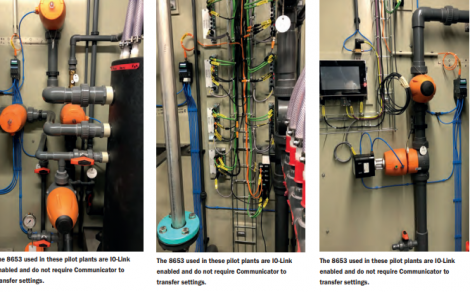- Home » Editorial » Pneumatics
Drop-in valve island solves process control challenge for membrane pilot plants

Creating improved water treatment processes within the existing plant footprint requires emerging technologies to be tested in real-world applications. The use of pilot plants plays a vital role in fine-tuning this equipment for full-scale operation and Bürkert has supported a variety of key projects including the recent delivery of ceramic membrane ultrafiltration systems to a number of utilities in the UK. H&P reports
As an expert in ceramic membrane filtration, Nanostone was looking to widen the use of this emerging technology within the UK water treatment sector. Working with Ross-Shire Engineering (RSE), the two companies designed pilot plants that can be used in both clean and wastewater treatment plants. Initially four plants have been constructed to house ceramic ultrafiltration membranes and enable them to be used for the filtration of water. Each plant is leased to the utility for a set period before a decision is made on longterm installation or use on another site.
Solving supply issues
The first two plants were equipped with process control equipment from a supplier nominated by Nanostone. However, the timing of these builds coincided with the increasing worldwide supply challenges. When the time came to manufacture the next two plants, lead times on some parts were being extended significantly. For the process control valve island, the original supplier was not able to provide an expected delivery date within that year.
The Senior Technical Manager at RSE, Paul McCloskey, suggested Bürkert as a parallel supplier that could deliver highquality products as a direct replacement for the items specified by Nanostone. Aside from the usual specifications for these valve islands, a key attribute was the I/O link and communications protocols that enabled the Bürkert Type 8653 to be used as a direct replacement.
The pilot plants are designed to allow various configurations to be tested to demonstrate the high performance and treated water quality possible from Nanostone’s ceramic ultrafiltration system when treating a wide range of raw water qualities including challenging surface waters and waste waters.
Compact solutions
Lee Mackenzie, Senior Mechanical Engineer, RSE, commented: “As a designer and manufacturer, changing suppliers in the middle of a project is not ideal, but it did offer us the opportunity to compare the two products side-by-side. The first, and most obvious difference, is the size of the original valve island, the Bürkert product is much more compact.”
Component size is very important in these projects because space is often limited, especially when you are trying to incorporate an additional process in an existing application. Compact controls make installation easier and quicker. In addition, the fact that the Type 8653 can be specified with either IP65 or IP67 protection, makes it very flexible in terms of location.
There is always a concern that design changes will be required to accommodate an alternative component, but in this situation, it was a drop-in replacement, and the time saving was significant. Following a discussion with Bürkert, the precise specification was quickly determined, and the short delivery time brought the pilot project back on schedule.
-
PPMA 2025
23 September, 2025, 9:30 - 25 September, 2025, 16:00
NEC, Birmingham UK -
Advanced Engineering Show 2025
29 October, 2025, 9:00 - 30 October, 2025, 16:00
NEC, Birmingham UK










